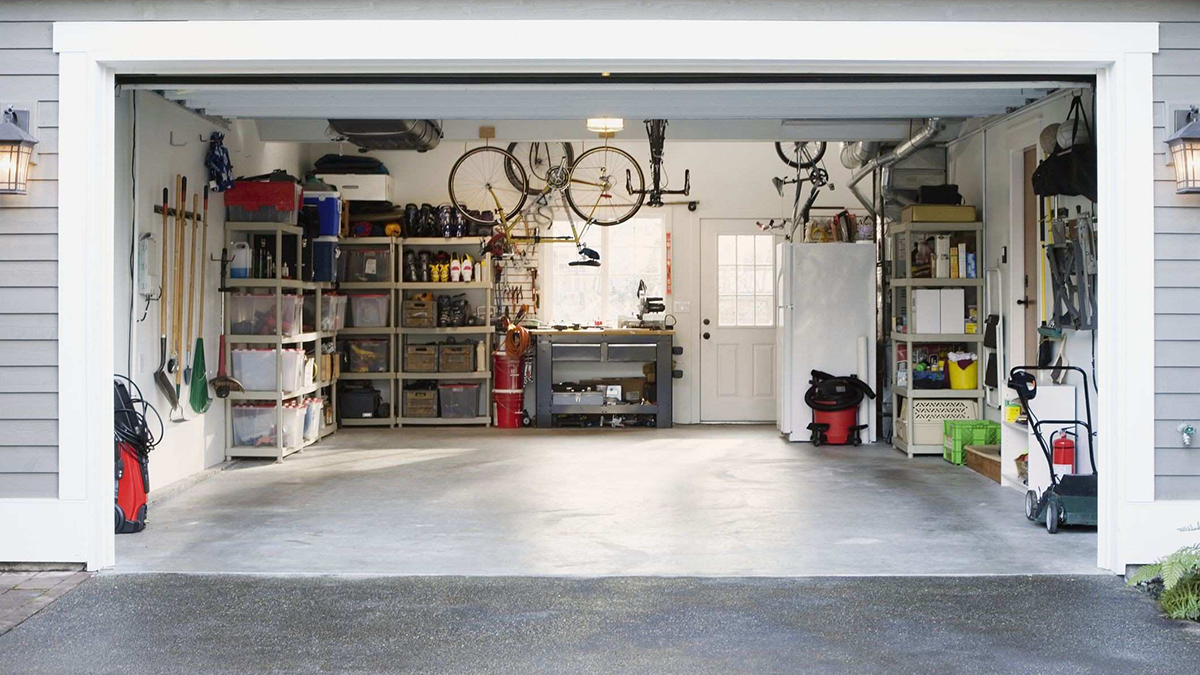A clean garage floor not only provides peace of mind but is ultimately much safer. It’s also essential if you plan to apply a garage floor coating like epoxy or single-part polyurea. Keeping it clean, however, is challenging and dirt, debris, or stains can easily build up to unreasonable levels.
The amount of neglect and nature of these stains will inform your approach to cleaning. Some situations call for a simple sweep while others may require the use of potent cleaners or heavy equipment like a pressure washer or floor buffer.
Whatever your circumstance, this guide will teach you how to clean garage floors in a safe and effective manner. Let’s explore some of the tools and equipment you will need to get the job done, first, then move on to the techniques.
Gather The Right Tools And Equipment
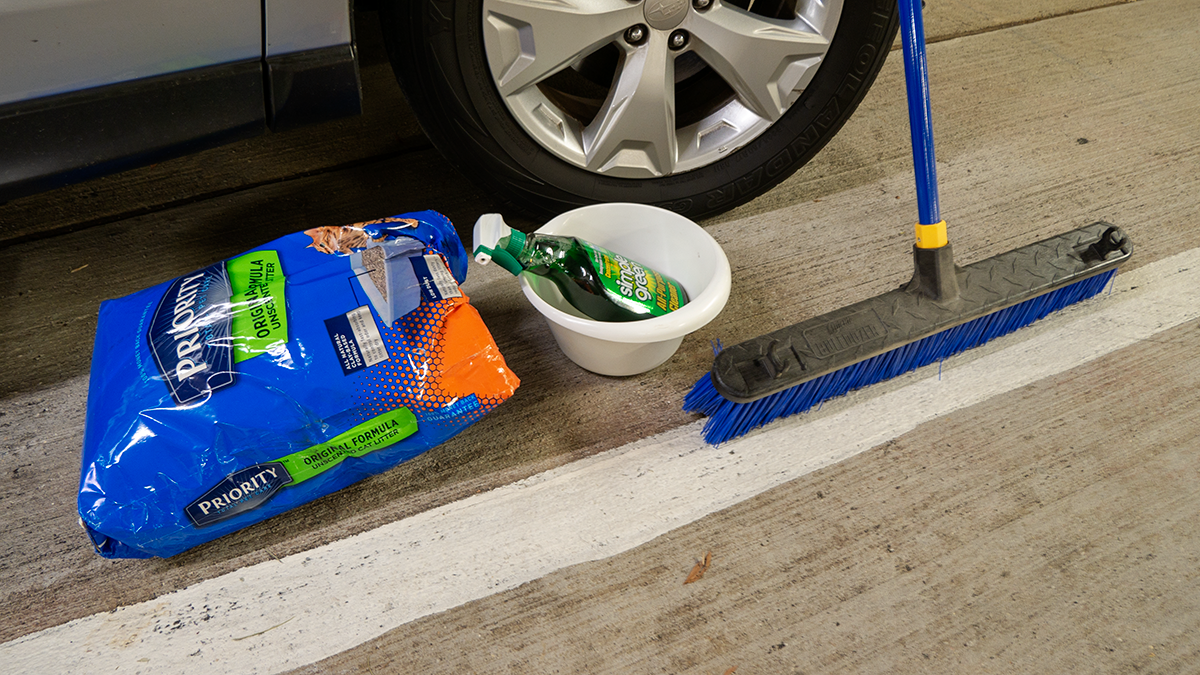
You will need some basic equipment to clean your garage floors, most of which you probably have on hand or is readily available for purchase or rent. If you do need to buy tools or equipment, I recommend getting the best you can possibly afford. Simply put, high-quality tools make the job easier and safer. When you consider replacement costs or potential damage to your surfaces, it’s often much cheaper in the long run, too.
Brooms And Brushes
Most outdoor cleaning tasks call for a stiff-bristled push broom to quickly and efficiently remove debris from rough surfaces like concrete. Obviously, in corners or other tight spots, they are hard to maneuver and a more precise upright broom should be used.
In most cases, synthetic bristles are recommended since they are water, chemical, and abrasion resistant. Natural bristles like broomcorn, yucca, and rattan tend to absorb water and chemicals that may limit their lifespan.
If your garage floors are smooth or you need to remove very fine material, a soft bristle or flagged bristle broom will work. Just know that using one on rough surfaces will quickly wear down the bristles and it may not clean dirt that has settled in small ridges.
Push brooms that combine soft and stiff bristles are also an option. The O-Cedar Professional Maxi-Lok, for example, combines soft outer bristles for fine dirt and sturdy inner bristles for large debris. It’s built specifically for outdoor sweeping tasks like sidewalks, decks, and is perfect for garages.
Scrubbing your floors requires a dedicated scrub or deck brush. These brushes look a lot like push brooms but have short, rigid bristles that offer more abrasive cleaning action. To save your back, consider getting an upright scrub brush, though, you may need a handheld brush for snug corners.
Pressure Washer
Pressure washers are great at removing tough stains and are fun to use. If scrubbing doesn’t work, then shooting a high-pressure jet of water at it is your best chance at success.
When it comes to pressure washers, there are a ton of available features and options that are meant to improve the cleaning action. Many let you add cleaner directly to the water, change spray nozzles for increased pressure, and some, called power washers, are heated.
Pressure washers are powered in two ways – gas or electricity. Gas-powered pressure washers are more powerful, in general, but are loud and require ventilation when used in enclosed space like a garage. Electric pressure washers are much quieter, but are not as powerful and require an extension cord that makes them less portable.
Either type will work, but having more power than needed isn’t a bad thing. Evaluate the job and consider how dirty your floors are first before making a purchase or renting one.
If you are using a pressure washer to clean your garage floors, you may want to consider a surface cleaner. This attachment replaces a standard spray nozzle to give you a much larger cleaning path, making the job a whole lot quicker. They’re widely available online, and, if you’re interested in seeing one in action, check out Reddit.
Cleaners And Chemicals
I’ve scrubbed a lot of floors over the years and find that most garage cleaning tasks only require a standard degreaser or mild detergent. However, in certain cases, like severe oil and rust stains, an application specific concrete cleaner may be appropriate.
Simple Green All-Purpose Cleaner has worked well for me over the years and it’s environmentally friendly. Laundry detergent also works well in a pinch and the good news is you probably already have some. It’s pretty mild stuff and creates a nice sudsing action that suspends dirt well.
These solutions are generally available in liquid or powder form and you simply mix them with water, pour it on the floor, scrub it, and wash it away. Others, like Terminator-HSD Concrete and Driveway Cleaner, just need to be spread over deep stains and left to do their thing.
Trisodium Phosphate (TSP) is another popular and very capable garage floor cleaner but has a few drawbacks you should be aware of. It works well on a variety of surfaces like brick, stone, cement, and wood but should not be used on painted surfaces. It’s also dangerous for the environment and can worsen hypertrophication in small bodies of water, so use the least amount possible.
Other Useful Equipment
Beyond what is listed above, there are a few more pieces of equipment you should have on hand – a bucket to prepare and store your cleaning solution and a garden hose with a high-pressure nozzle to spray it away.
I’ve used a ton of buckets, and, in reality, they’re pretty much all the same. A cheap bucket from any big box store will be more than sufficient. If you are looking for a decent garden hose, however, there’s a tremendous amount of variety.
Look for a hose that’s strong, lightweight, flexible, and kink resistant. The Flexzilla Garden Hose, for example, is an excellent option that meets these criteria and won’t break the bank either.
When it comes to spray nozzles, there is a lot of variety, too. Adjustable pattern sprayers, like the SprayTec Garden Hose Nozzle Sprayer, work great and can be used for other tasks like watering plants and cleaning cars but aren’t strictly necessary. A simple single pattern spray nozzle will work just as well for this task and they’re cheaper.
Prepare Your Garage And Assess The Situation
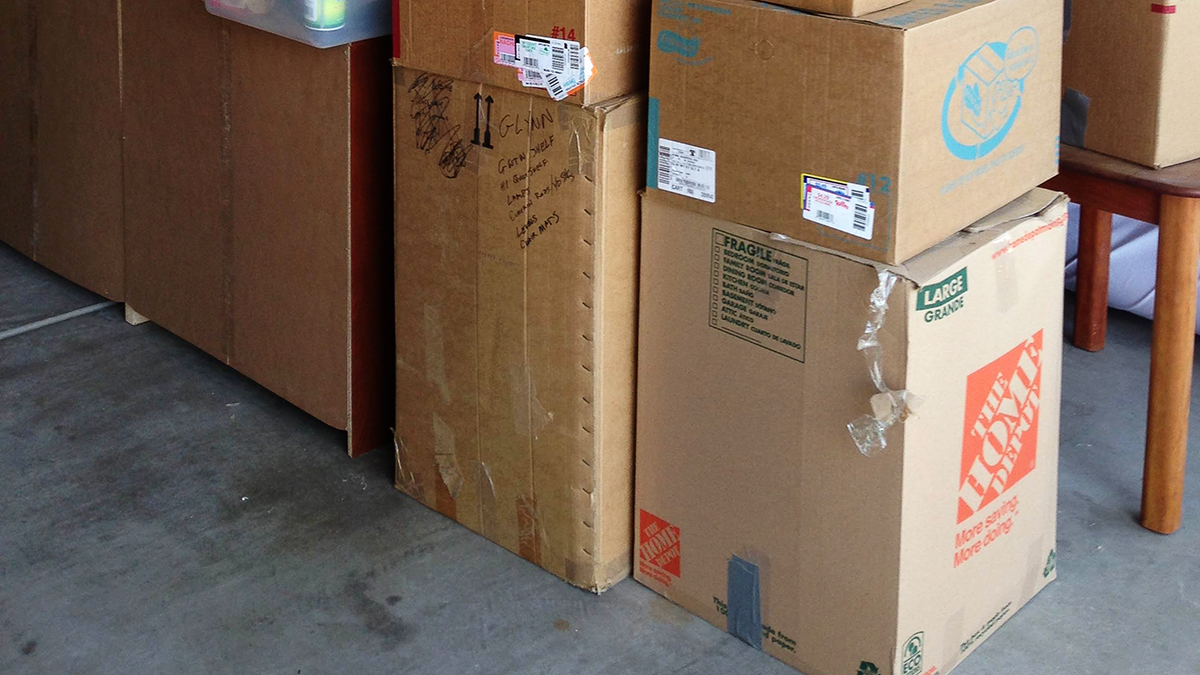
If your garage floor just needs a sweep then removing everything may not be necessary. If you are using a pressure washer or other equipment, however, then it is required. Remove all shelves, benches, boxes and anything else sitting on the floor and secure them in a safe, dry space.
Sensors and outlets may be damaged or create a safety hazard if inundated with water. Water can also destroy your walls, especially if they are untreated or bare. In order to protect them, plastic sheeting or moisture resistant dropcloth should be taped to the wall. Sensors can be wrapped with the same material or with a plastic grocery bag.
Once everything is removed, walls are protected, and sensors covered perform a sweep of the floor removing all the dirt and debris. At this point, we can assess the situation and determine what our next step will be.
Organic material, like dirt, mold, and algae can generally be removed with water and a mild detergent. More stubborn stains like oil, rust, and paint may require additional equipment like a pressure washer, floor buffer, or chemicals.
Regardless of the nature of these stains, it’s best to start with a gentle method, like scrubbing, first. Progressing in this way can prevent potential damage or etching of your floors and is usually the most cost-effective approach.
Scrubbing Your Garage Floors
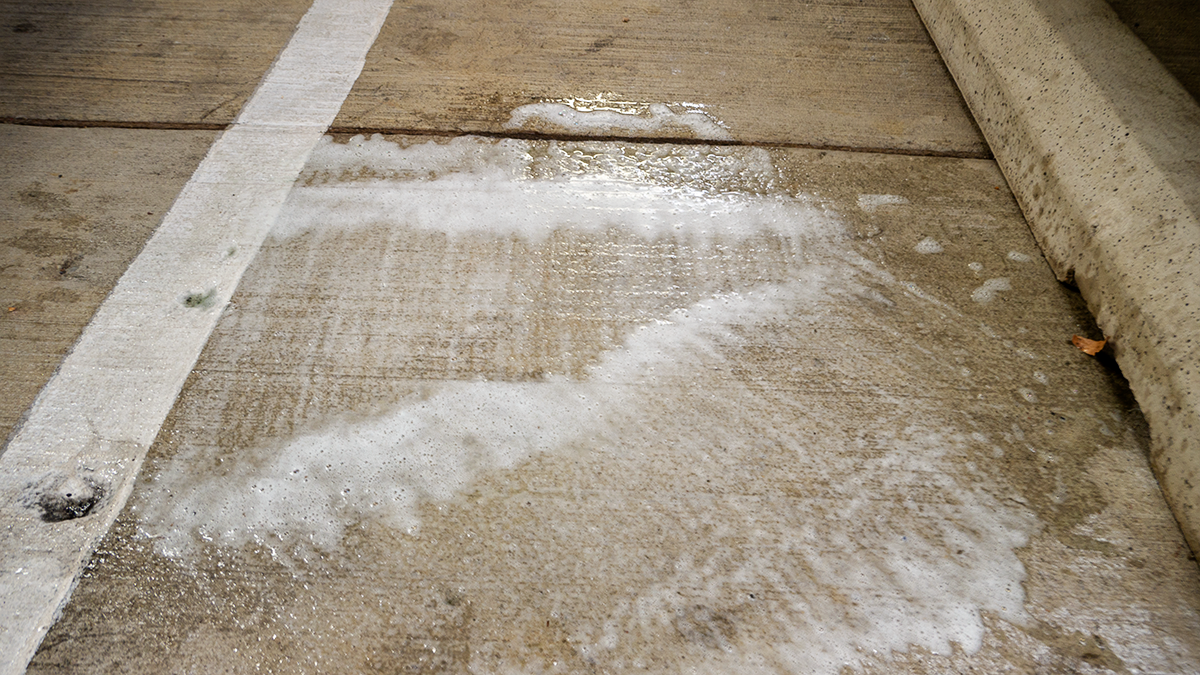
To effectively scrub your garage floors, you will need a few simple pieces of equipment – a bucket, scrub brush, degreaser or detergent, and garden hose with a high-pressure spray nozzle.
Please note that some degreasers are not compatible with painted surfaces, certain metals, natural stone, or plant life. I’ve had luck with Simple Green All-Purpose Cleaner, which is environmentally friendly, non-toxic, and biodegradable. Common laundry detergent can be used, too, and it’s also ecologically sound.
To prepare your cleaning solution, fill a bucket with warm water and add the required amount of cleaner as prescribed by the manufacturer. Gently mix the solution until it is thoroughly combined.
Starting with the most soiled spots first and working in small sections, pour a generous amount of solution on to the floor. Allow the solution to soak into tough stains for about 10 minutes making sure that it doesn’t dry. If needed, add some more solution and begin scrubbing with a stiff bristle scrub or deck brush.
Make sure that the solution is producing suds. The abrasive bristles will dislodge the material but the cleaner emulsifies it and suspends it in the suds preventing it from being deposited back on to the floor. Once complete, rinse the solution away with a high-pressure spray nozzle and move on to the next section.
It is not uncommon for you to have to repeat this process two or more times depending on the state of your floors. But, allow everything to completely dry so you can accurately identify where your trouble spots are.
Cleaning Oil Stains On Your Garage Floor
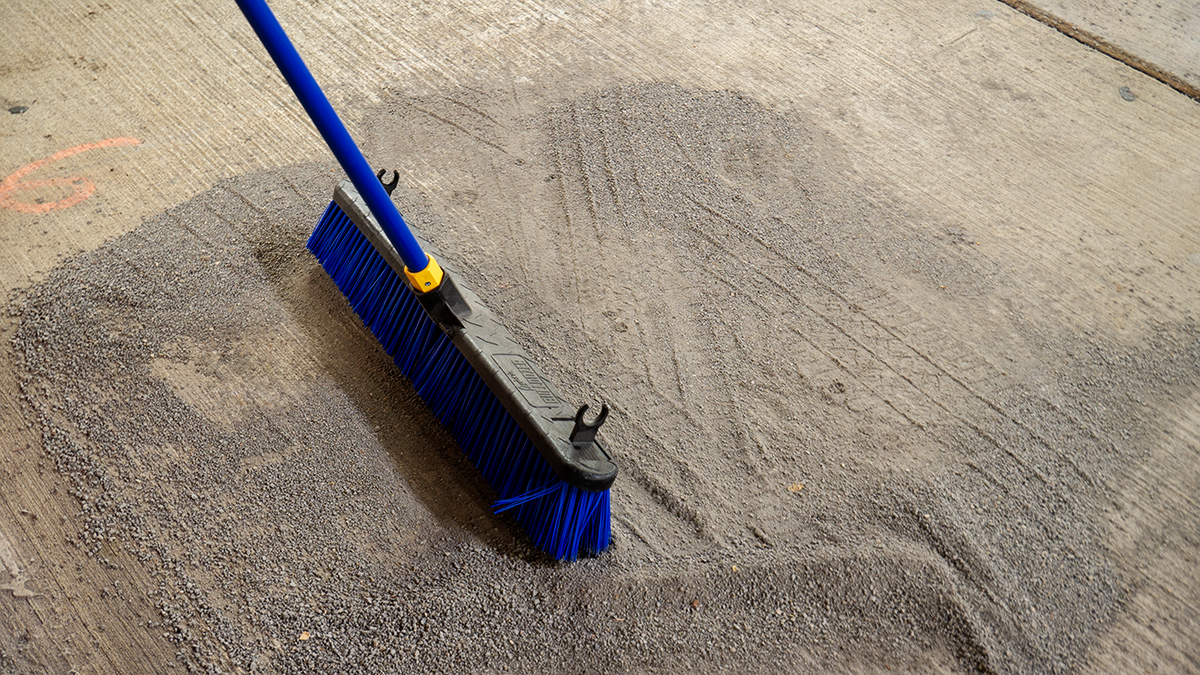
Since concrete garage floors are porous, oil tends to soak in quickly and is tough to remove. How you approach cleaning these stains will depend on how old or set in they are.
An ounce of prevention is worth a pound of cure, and, there’s a great chance of stopping stains in their tracks if you handle a spill when it happens. You should immediately remove oil from the surface using an absorbent material like OIL DRI, sawdust, or clay cat litter.
But, if the oil isn’t completely removed or you already have set in stains, the next step is to scrub the floor using a degreaser or detergent. Using the steps outlined previously, prepare your solution, presoak your stain, and begin scrubbing with a deck or scrub brush.
It’s important to do a thorough job, and, if possible, not let the solution dry before you are done. Oil can spread and create a bigger stain if you don’t scrub and rinse it properly.
For persistent stains, consider a specially made concrete degreaser like GP66 Miracle Cleaner. Products like these penetrate and dissolve oil, and, when used in conjunction with scrubbing, are very effective. Some products can even be applied and left to do their work with no other action needed.
While pressure washers will efficiently remove dirt it may force oil deeper into the concrete itself. As such, it usually isn’t a recommended approach or at least one that is used as a last resort.
Cleaning Stains On Your Garage Floor
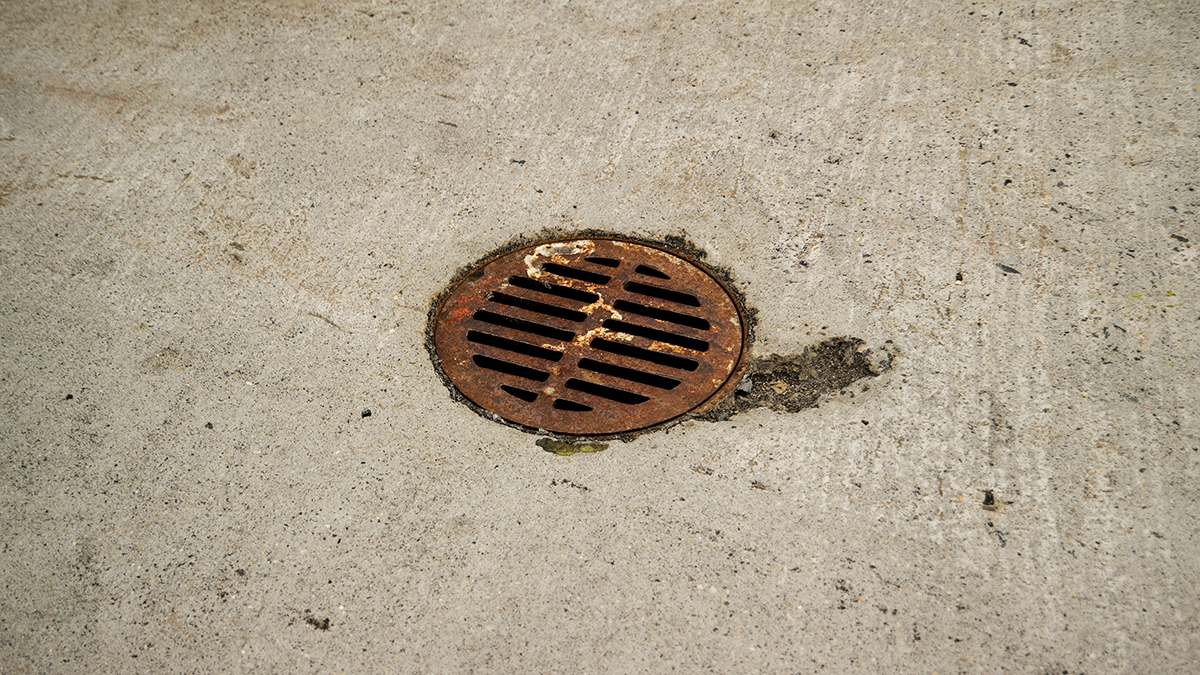
Rust stains can occur for a myriad of reasons. Many times these stains come from metal drains or iron present in the concrete itself. Removing them is not difficult but make sure the conditions that created them in the first place are fixed.
Minor rust stains can be removed in the exact same way as other stains and a typical degreaser or detergent should be sufficient. Simply apply your cleaning solution to the floor, scrub, and wash away.
Another common method for removing minor rust stains is to use lemon juice or vinegar. Apply these to the stain and let sit for approximately 10 minutes before scrubbing and rinsing. The acid should neutralize and dissolve rust reasonably well but isn’t tremendously effective on really dense stains.
If all else fails, step up to a commercial rust remover, Trisodium Phosphate, oxalic acid, or muriatic acid. Note that these compounds can be very caustic and harmful to animal and plant life in many cases. Muriatic, for example, will etch and weaken your concrete if the concentration is too high. Know your limitations and use proper safety precautions before moving forward.
Final Tips And Wrap Up
At this point, you should have a solid understanding of garage floor cleaning techniques and be able to tackle the job with confidence. Regardless of the type of stain, you should always approach cleaning with the least invasive procedure before progressing to harsher ones.
Gather your equipment, protect your walls, remove any loose dirt or organic materials, and evaluate the situation. Most jobs start with scrubbing, and, if that is not effective, step up to a pressure washer or harsher chemicals. That will get you through all but the most severe jobs.
Make sure to work safely, follow manufacturer recommended guidelines, and avoid damaging your surfaces. Your quick and simple cleanup job can turn expensive and time-consuming quickly.
My final tip is to manage your expectations. Some stains are very stubborn and you may not be able to clean them all. Do what you can and determine if stepping up to more robust equipment is worth it in the long run.
